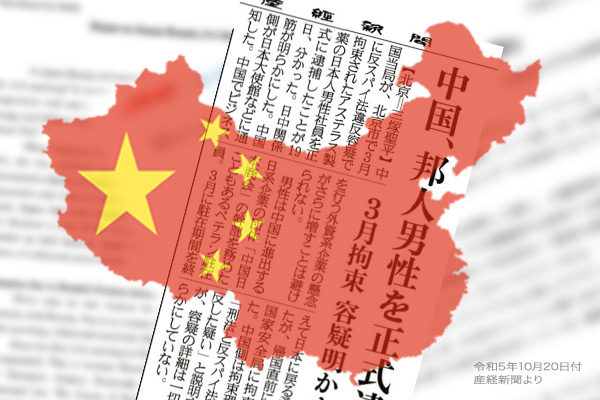A male executive in his 50s at a major Japanese pharmaceutical company who had been detained by Chinese authorities in Beijing since March on suspicion of “espionage” was formally arrested in mid-October. He will be indicted and tried behind closed doors. A conviction is highly likely.
The executive, stationed in Beijing for more than 20 years, is a caring person who regularly donated medicines to poor areas in China. As he is a dear friend of mine, I have been concerned about his safety since he was taken away by Chinese authorities at Beijing airport. During the six months of detention, he must have been subjected to harsh interrogation. Based on my past coverage of similar cases, I suspect that the executive may have already pleaded guilty to the charges alleged by Chinese authorities.
Detention in a basement without sunlight
Under Chinese law, pre-arrest detention is called “residential surveillance” during which a detainee is usually confined to a basement of a facility called an invitation center. The basement has no windows, with bedroom doors removed. Its living room is monitored 24 hours a day by multiple police officers. The lights cannot be turned off. The hardest for detainees is the lack of sunlight. As detention continues for several months, detainees may become mentally ill and confess to all the fabricated crimes in order to go outside and soak up the sunshine. It is without saying that such Chinese approach is a serious violation of human rights.
What crime did this executive commit? The Chinese side has so far disclosed nothing at all. Early this month, the Chinese government released Chinese-Australian journalist Cheng Lei after detaining her for three years on suspicion of leaking state secrets. In an interview with Australian media, she explained that the reason for her detention was that she shared embargoed information with third persons a few minutes before the embargo was lifted.
Embargoed information is leaked occasionally in the media industry. A leak of embargoed information may be protested for breaking rules, but it is not a crime. As many as three years of imprisonment are definitely an overreaction. Cheng’s arrest coincided with the Australian government’s criticism of China over COVID-19 information control and is generally seen as part of China’s political retaliation against Australia. Cheng’s release is said to be related to the Australian prime minister’s planned visit to China next month.
Five Japanese nationals still remain detained
In recent years, the number of cases in which China detains foreigners on suspicion of espionage and other charges has increased rapidly. Americans, Canadians, and Swedes are reportedly among the detainees. Over the past several years, 17 Japanese nationals have been detained for political reasons. At least five of them still remain detained in China.
In order to rescue these nationals, the Japanese government should protest and negotiate tenaciously with Chinese authorities while enhancing cooperation with other governments.
Akio Yaita is Taipei Bureau Chief of the Sankei Shimbun newspaper.


